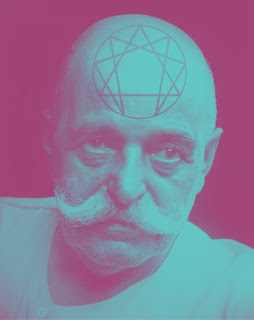Gurdjieff’s Fourth Way
Gurdjieff (1866 -1949) taught that most humans do not possess a unified consciousness and thus live their lives in a state of hypnotic "waking sleep", but that it is possible to awaken to a higher state of consciousness and achieve full human potential. Gurdjieff described a method attempting to do so, or “the Work” or “the System.” According to his principles and instructions, Gurdjieff's method for awakening one's consciousness unites the methods of the fakir, monk and yogi, and thus he referred to it as the "Fourth Way".
In parallel with other spiritual traditions, Gurdjieff taught that a person must expend considerable effort to effect the transformation that leads to awakening. The effort that is put into practice Gurdjieff referred to as "The Work" or "Work on oneself". Gurdjieff's teaching addressed the question of humanity's place in the universe and the importance of developing latent potentialities—regarded as our natural endowment as human beings but rarely brought to fruition. He taught that higher levels of consciousness, higher bodies, inner growth and development are real possibilities that nonetheless require conscious work to achieve.
Gurdjieff felt that the traditional methods of self-knowledge—those of the fakir, monk, and yogi (acquired, respectively, through pain, devotion, and study)—were inadequate on their own and often led to various forms of stagnation and one-sidedness. His methods were designed to augment the traditional paths with the purpose of hastening the developmental process.
Gurdjieff gave new life and practical form to ancient teachings of both East and West. For example, the Socratic and Platonic emphasis on "the examined life" recurs in Gurdjieff's teaching as the practice of self-observation. His teachings about self-discipline and restraint reflect Stoic teachings. The Hindu and Buddhist notion of attachment recurs in Gurdjieff's teaching as the concept of identification. His descriptions of the "three being-foods" matches that of Ayurveda, and his statement that "time is breath" echoes jyotish, the Vedic system of astrology. Similarly, his cosmology can be "read" against ancient and esoteric sources, respectively Neoplatonic and in such sources as Robert Fludd's treatment of macrocosmic musical structures.
The Fourth Way addresses the question of humanity's place in the Universe and the possibilities of inner development. It emphasizes that people ordinarily live in a state referred to as a semi-hypnotic "waking sleep," while higher levels of consciousness, virtue, unity of will are possible.
A person must free the soul by following a teaching which can lead to this aim or "go nowhere" upon death of his body. Should a person be able to receive the teaching and find a school, upon the death of the physical body they will "go elsewhere." Humans are born asleep, live in sleep and die in sleep, only imagining that they are awake with few exceptions. The ordinary waking "consciousness" of human beings is not consciousness at all but merely a form of sleep."
Gurdjieff taught that traditional paths to spiritual enlightenment followed one of three ways:
- The Way of the Fakir
The Fakir works to obtain mastery of the attention (self-mastery) through struggles with the physical body involving difficult physical exercises and postures.
- The Way of the Monk
The Monk works to obtain the same mastery of the attention (self-mastery) through struggle with the affections, in the domain, as we say, of the heart, which has been emphasized in the west, and come to be known as the way of faith due to its practice particularly in Catholicism.
- The Way of the Yogi
The Yogi works to obtain the same mastery of the attention (as before: 'self mastery') through struggle with mental habits and capabilities.
Gurdjieff insisted that these paths – although they may intend to seek to produce a fully developed human being – tend to cultivate certain faculties at the expense of others. The goal of religion or spirituality was, in fact, to produce a well-balanced human being capable of dealing with all eventualities that life may present. Gurdjieff therefore made it clear that it was necessary to cultivate a way that integrated and combined the traditional three ways.





Comments
Post a Comment